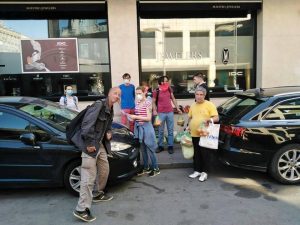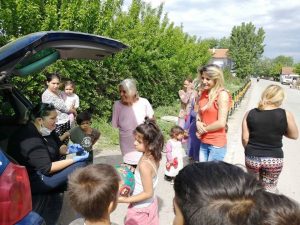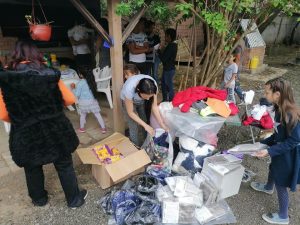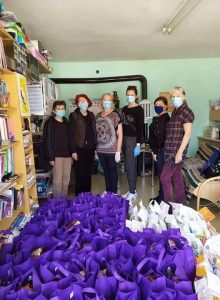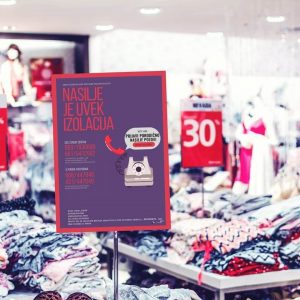Solidarity is our strength – the Reconstruction Women’s Fund’s response to the Covid-19 crisis
09 Jul 2020
This piece originally appeared on the website of the Reconstruction Women’s Fund (RWF), the first local women’s foundation in Serbia, established in 2004. RWF supports and sustains feminist political action against war, nationalism, racism, militarism, all kinds of discrimination and gender-based violence.
The global crisis caused by the Covid-19 pandemic, as crises usually do, has laid bare some of our society’s deep structural issues, by additionally marginalizing already marginalized groups. The state of emergency in Serbia was enforced in March for a then undefined period of time and, as the measures became more and more restrictive, the public was overwhelmed with oftentimes contradictory recommendations and information. The A11 Initiative for Economic and Social Rights followed the situation closely and produced an analysis of the measures derogating from human and minority rights during the state of emergency. The report pinpointed some of the most worrying dimensions of the pandemic, including the reaction to the crisis from those in charge.
Soon enough, the practical implications of the crisis became widely known: the lockdown conditions caused a spike in violence against women and youth; workers were forced to continue working without proper personal protective equipment, while others were losing their jobs or had their salaries reduced; freelance artists were left without state support; the healthcare system faced massive challenges it wasn’t prepared for, etc. Many of these issues were tightly interwoven, though the individuals affected by these challenges, largely, did not receive attention nor care from those in charge. The strict measures for protecting public health, most of the time, were not accompanied by systemic support for those who struggled to access basic necessities precisely because of the measures.
In this moment of enormous uncertainty and confusion, we knew that we needed to act quickly, responsibly and efficiently, thinking about those who are typically neglected, and about those who would likely become even more neglected during the state of emergency. This thinking guided the support we provided during the first phases of the pandemic and, throughout the state of emergency, RWF has followed these principles:
- Solidarity– Support, compassion, understanding, exchange, connection and solidarity will lead us through the crisis, as will working with a diverse set of partners. In the Covid-19 scenario, sometimes solidarity implied urgent financial support, sometimes words of compassion, and sometimes it simply meant giving time and space to groups so that they can deal with challenges in their own ways.
- Flexibility– We tried to make our flexible funding mechanisms even more flexible. We were ready to respond to our partners’ diverse needs, keeping in mind the different contexts in which they work. Some partners’ planned activities were adjusted to adapt to the conditions of the crisis (quite successfully!), some were fully transformed (with loads of creativity!), and some were postponed (but we’re still looking forward to them very much!). The state of emergency also meant that we needed to build flexibility into our daily work routines – we “moved” into a virtual office but continued working, thinking and sharing as a team.
- Communication– The unpredicted and unpredictable circumstances on the ground frequently required more intense communication with the groups that we support. However, we kept in mind that we all deal with crises in different ways, so we followed the general principle of being available to the groups, but not overburdening them with excessive communications that might not be welcome. We stayed connected to our community by sharing relevant reading materials, old and new texts from our website, etc.
- Responsiveness – The needs that emerged due to the immediate consequences of the pandemic required quick reactions. We were ready to provide both financial and non-financial support to our partners: we shared information, knowledge and resources; we kept ourselves available for all sorts of consultations and conversations; and, we connected groups that could be valuable to each other during the crisis, as well as in future collaborations.
- Connecting– Besides connecting diverse groups, we also tried to deepen our own connections with similar organizations and international networks, with the hope that joining in some strategizing sessions may help us to pass this crisis. We participated in numerous online discussions organized by the networks of which RWF is a member of (including the Foundations for Peace Network and the Prospera International Network of Women’s Funds) as well as discussions organized by ally organizations such as the GFCF. We participated in these conversations in order to gain insights into how the pandemic was playing out around the world, and to exchange useful information while building a wide network of solidarity and support.
Collaboration with groups
While it is our standard practice to understand needs on the ground by listening to what our grassroots partners are telling us, the pandemic has further underlined the importance of this approach. The direct consequences of the Covid-19 crisis in Serbia could be summarized as follows: additional danger for those already endangered and deeper marginalization of those already marginalized. However, how this played out in different contexts varied, which is why our responses and support also varied on a case-by-case basis.
Rapid Response Grants Programme
The bulk of the financial support to our partners during the lockdown period was from our pre-existing Rapid Response Grants Programme, which was envisioned as a mechanism to provide urgent support in times of crisis, in situations where there have been human rights violations, if an activist’s safety is compromised, or in any other unexpected situation that may arise in a country that is as politically unstable as ours. As expected, the need for urgent financial support over the course of the state of the emergency only intensified. The problems faced by vulnerable groups and communities only served to remind us of the deep, systemic lack of care for the most vulnerable in our society.
Liceulice (Belgrade and Novi Sad)
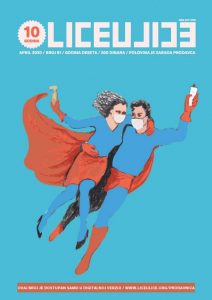
The April 2020 online edition of Liceulice
The street magazine Liceulice was among one of the first organizations that we supported with a Rapid Response Grant during the Covid-19 crisis. Liceulice contacted us in March, when they were uncertain about what the pandemic would mean for the individuals who sold their magazine on the streets. Most of these individuals were from marginalized groups, and the magazine was deeply concerned about the abilities of these individuals to afford rent and access basic supplies and essentials during the lockdown period without income from magazine sales. Liceulice launched a solidary campaign, managing to cover the expenses of the individuals over several months, and RWF supported this initiative with a grant. These funds provided needed support to the most vulnerable magazine sellers from Belgrade and Novi Sad, including food and hygiene packages as well as psychosocial support. The grant also helped Liceulice to produce a special online edition of the magazine.
BeFem (Belgrade)
In March, we also provided supported to BeFem, a feminist cultural centre, so that they could conduct their campaign Feminist Quarantine Diaries. At the very beginning of the crisis, the group recognized that women’s voices and feminist and activist perspectives risked being marginalized in the public discourse during the state of emergency. Their campaign encouraged activists from Serbia and the wider region to contribute video reports which included personal and political perceptions of the crisis, as well as recommendations for managing self-isolation and tips to keep activists organized during this period. The campaign has created new alliances and a sense of solidarity in the feminist community. BeFem’s report on the campaign notes that:
“The experience of the pandemic has shown us the strength of women’s solidarity, as well as the immeasurable importance of women, women’s work and knowledge in emergency situations. For all of us, this was a completely new experience in creating the ‘new normal’, armed with a new understanding of the lack of systemic and institutional care for vulnerable groups – women and children in particular. Feminist practice has shown how public policies and services can be created differently, which is why it is important to open up spaces for womens’ voices. The pandemic has also shown us the importance of frontline healthcare workers – many of them are women, and it is important to keep reminding the patriarchal community of that.”
Collective Action a Roof Above Head (Belgrade, Novi Sad and Subotica)
In April, we supported Collective Action a Roof Above Head who had self-organized and were making regular donations of food and hygiene products to marginalized groups – those living in non-formal settlements or overpopulated settlements, homeless individuals, as well as others who were having difficulties making ends meet. The organization is traditionally most well-known for defending people from unjust evictions, but it widened its field of work to respond to the crisis. The support it is providing on the ground is much more than humanitarian aid – their actions, which have continued after the lockdown period, are highlighting wider issues, such as Serbia’s housing crisis and the urgent need to address this. According to the group’s Facebook page, a day in the life of an activist from this group looked like:
Jovan: It went ok, it was a seven-member family with all the income they have being a single small salary, now slashed to 15,000 dinars, and they were very grateful because the Easter holidays have financially drained them.
Šejn: Nađa and I have brought a package to the Asmeti family.
Aleksa: The package was sent to the Kovačević family.
Una: My brother and I have brought packages to three families in Pančevo.
Boris (Subotica): Today, six families in Subotica were covered. 20 children overall among them. The solidarity kitchen has distributed 170 meals for the poor and homeless, and the team for the homeless brought food to 35 homeless people.
We wish to ask you not to be angry with us if you continue to wait for help – the money runs out quickly, and our team is already fighting like lions to achieve everything we can with what we have. 50 of us are trying to feed 1,400 people, without any previous training. It means that mistakes, omissions and delays will happen. One who works, makes mistakes, but we’re learning along the way and improving our work all the time. No one hungry, no one without a home!
Over 90% of the funds raised by Collective Action a Roof Above Head came from small donations, and their hope is that this giving will continue beyond the crisis period. For many families forgotten by the system, this sort of support is their only guarantee of survival.
Association of Roma Women NADA (Aleksinac)
In numerous Roma settlements across the country, the Covid-19 crisis has served to further exacerbate already existing issues which, again, have not been addressed by formal institutions. The plight of Serbia’s Roma populations during the lockdown period has reminded us once again of the structural racism, neglect and marginalization experienced by this group. One of the major challenges for the Roma has been that the state of emergency has reduced the possibility to work for those who made a living by collecting waste. The result for many was an inability to put food on the table, let alone to access personal protective equipment.
With the rising numbers of people infected by the Covid-19 virus in Aleksinac and its surroundings, the Association of Roma Women NADA recognized the urgency of providing hygiene products in the Roma communities around Aleksinac. With a grant from RWF, the Association distributed hygiene packages to 80 families in Roma settlements in Žitkovac and Prćilovica. Visiting the communities also gave the Association the opportunity to inform the residents about precautionary measures and disease prevention – information which was previously unavailable to many in these communities as many homes do not have electricity (and therefore are without access to the media).
Roma Centre for Women and Children Daje (Belgrade)
In May we also supported our long-term partners from the Daje Centre in their work to distribute food and hygiene packages in isolated Roma settlements. On these occasions, women from the settlements were additionally provided with monthly bus tickets so that they would be able to leave the settlements in search of healthcare, jobs, etc. Much more than a reaction to a crisis, the bus tickets also allowed the Daje Centre team to build relationships with these women. The team were able to gain insights into the escalation of domestic violence during the state of emergency in these settlements, and were also able to identify those women in danger who may need further support.
Besides this work done with RWF funding, the Daje Centre also carried out a number of other actions in respond to Covid-19, including establishing an SOS helpline that was available 24/7 and setting up a Facebook page where individuals could access psychological support. Their experiences from the field during the pandemic are revealing as to the situation of Roma communities in Serbia:
“During the state of the emergency, the confusion of women grew, and many women who were suffering from male violence found themselves in a ‘frozen condition’, where doing nothing was their defense mechanism in the given circumstances. Many women who have survived partner violence during the curfew have not dared to leave the violent environment, fearing the fines for breaking the curfew. Also, many of them hesitated to call the police and report violence, thinking that the police have “more important” issues during the state of emergency. According to our data, during the state of emergency, there were situations when the police wouldn’t come after reports of domestic violence (Daje has reacted to this). Also, according to the field information, during the state of the emergency, there were cases when the ambulance also wouldn’t come after calls from the Roma settlements.”
Women in Black (Belgrade)
During the 2014 – 2016 floods, Women in Black was one of our main allies in combating the crisis. Women in Black approached the Covid-19 crisis, this time a global one, with a specific understanding of its political, class, gender, ethnic and other dimensions. The group recognized that the activists themselves who make up their network may require additional support during Covid-19, with particular care and attention being given to activists older than 65. With a grant from RWF, Women in Black was able to conduct meetings offering solidarity and support to activists in Novi Sad, Petrovaradin, Leskovac, Vlasotince, Kruševac, Kikinda, Pančevo and Đulići (Bosnia and Herzegovina). These meetings were centred around feminist care principles, and were motivated by a desire to stand in solidarity with the activists.
During the pandemic, Women in Black have also maintained regular communication with activists in the wider region, as well as from the international network of Women in Black (which includes activists from Italy, Spain, Belgium, U.K., Turkey, Latin America and the U.S.), gaining insights into the state of the pandemic globally, including its consequences and layered dimensions. During the pandemic the group’s work also included psychological support to activists in the region delivered by a therapy team from Women’s Tribunal. Women in Black have additionally organized a conference in Radmilovac devoted to the Covid-19 crisis and its diverse implications. Throughout all of their pandemic-response activities, much like in their work over the past three decades through major and minor crises, Women in Black keep reminding us that solidarity is our strength.
Out of the Circle (Niš)
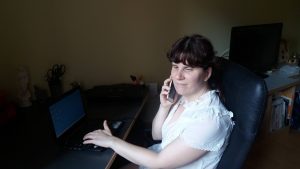 During the initial phases of the Covid-19 crisis, not only were marginalized communities endangered, but also the sustainability of the groups fighting for the dignity of these marginalized populations was called into question. In May, we used our Rapid Response Grants Programme to support Out of the Circle Niš, an organization providing legal and psychosocial support to women with disabilities, and which offers protection to women with disabilities who have suffered from some form of violence. During the state of emergency, the group was left without much-needed state financial support and found itself in a difficult position – it was facing an increasing amount of requests to support at risk women, but didn’t have the resources to respond adequately. A grant from RWF provided needed bridging funding during the period of crisis, to ensure continuity in its work on behalf of women with disabilities.
During the initial phases of the Covid-19 crisis, not only were marginalized communities endangered, but also the sustainability of the groups fighting for the dignity of these marginalized populations was called into question. In May, we used our Rapid Response Grants Programme to support Out of the Circle Niš, an organization providing legal and psychosocial support to women with disabilities, and which offers protection to women with disabilities who have suffered from some form of violence. During the state of emergency, the group was left without much-needed state financial support and found itself in a difficult position – it was facing an increasing amount of requests to support at risk women, but didn’t have the resources to respond adequately. A grant from RWF provided needed bridging funding during the period of crisis, to ensure continuity in its work on behalf of women with disabilities.
Social Centre October (Belgrade)
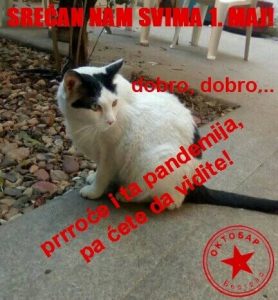
October’s mascot, Moćko the cat
For almost seven years, the Social Centre October has been well-known in Belgrade as a meeting place for activists. Based on the principles of self-sustainability and solidarity, the Centre raises funds to sustain its operations from visitors to the space. The Centre is widely regarded as an essential meeting point for leftist, feminist, green and other progressive ideas, and through various activities the Centre connects different groups and individuals, and has been the starting point for many civic initiatives and protests. The state of emergency left the Social Centre October without any income, so we provided them with a bridging grant so that they could cover basic expenses in the short-term.
The Covid-19 crisis has led to some serious challenges for the functioning of traditional activist spaces that are mainly self-sustaining and solidarity-based, though the pandemic has also highlighted the importance of having such spaces available for progressive discussions. Covid-19 may be an opportunity for transforming progressive ideas, improving them, creating new solidarity networks, etc. …and all of this thinking and work will still need to have a “home” after the crisis.
Side note: October’s mascot, Moćko the cat, endured the pandemic quite well: he had a good break from his many usual visitors (he won’t admit that he missed them a little bit). October is still his empire, and the October collective keeps on visiting and taking care of him. He hopes the circumstances will be better soon and that he will again be able to attend the roundtables, film screenings, board game evenings, lectures and parties, expressing all of his feline love and rebellion.
Other initiatives
Some of the groups we support have adjusted their activities to directly respond to the needs of their communities, using RWF support alongside funds raised from other donors.
The SOS Centre for Women and Children Violence Survivors in Vlasotince, who we provided general support to, organized the distribution of hygiene and food packages for marginalized women in their community. Their Facebook page tells the story of their work:
“The COVID-19 pandemic which has left, and is leaving, a significant mark on women. The smile is gone from their faces, they are, as they say, forgotten by everyone, alone, hungry, sad, scared, tired, depressed, abandoned. Our visit and giving were enabled by our friends at the Reconstruction Women’s Fund and UN Women.”
SOS Women’s Centre from Novi Sad, another organization that received RWF general support, intensified its activities during and after the state of emergency, carefully following the rising numbers of cases of violence against women. They organized a crisis action team and have adjusted their activities to better respond to emerging needs from their community (which have doubled compared to the same period in 2019). They have: expanded their phone support; offered online support which is available 24 hours a day; provided legal assistance; organized a mediation service; and, provided support to youth (as during the lockdown, violence against people younger than 25 had also risen). They have been careful to document all of this work in detail, to build their own knowledge but also to remember the extraordinary struggles faced during this period.
The organization has also joined the campaign Hang the Poster. Save a Life launched by the IRIDA organization. In collaboration with local cafés, shops and businesses, as well as with other interested individuals, campaign participants hang posters in visible spots, which provide valuable information for women experiencing violence or who feel at risk (who they can turn to for help, how, etc.).
Regular programs
In June, during a moment when it seemed like the pandemic had started to die down and the associated measures were loosened, we managed to conduct the regular grant round for our Special Focus Programme, awarding nine grants. Taking on board everything we had learned in the months prior, we adjusted the call to include a question about alternative ways of conducting activities, in case of new health risks.
What’s next?
We are receiving contradictory information about the pandemic again and there is a large amount of uncertainty regarding future precautionary measures, eventual restrictions, and even the real numbers of the infected. One thing is, however, certain – it seems that, like in previous crises, the marginalized will be pushed to the margins even further, having their basic rights denied and being left with no option other than to become dependent on the solidarity actions of self-organized groups and civil society. Solidarity, safety and good communication about grassroots needs will be our main priorities in future work to respond to this crisis, with a particular focus on the most urgent needs.
We are immensely thankful to our partner organizations with whom we are in continuous touch – thankful for their precious information and devotion to the work, solidarity and open collaboration. We are also thankful to the donors who have supported us for years with funds that were flexible enough to allow us to adjust to this new reality without major disruptions to our work. This support has, in turn, enabled us to provide essential support to our partner organizations.
By: Ana Imširović Đorđević – Operations Manager, Galina Maksimović – Community Coordinator & Đurđa Trajković – Fund Coordinator. For more information on the work of RWF, please contact office@rwfund.org.


